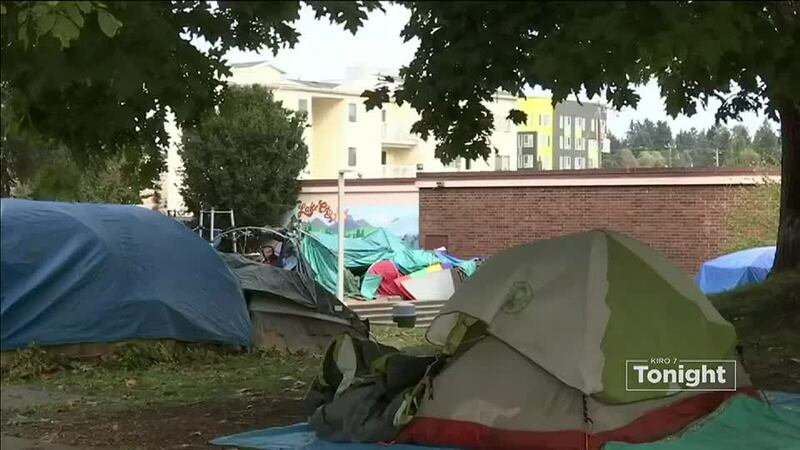SEATTLE — A new report confirms what you see with your own eyes: despite a lot of effort and funding, the homelessness crisis is getting worse, particularly for people experiencing chronic homelessness.
“It is startling to see we’re the second fastest growing chronic homeless population in the country at an annual growth of 42% (in) Seattle-King County,” said former Washington Governor Christine Gregoire.
The latest figures come from the new report, published by “Challenge Seattle” - an alliance of 21 CEOs from the region’s biggest employers, including Alaska Airlines, Boeing, Costco, Microsoft, T-Mobile, Nordstrom, Starbucks, Zillow and Kaiser Permanente – to name a few.
The group is led by Gregoire.
One of the six recommendations from the new report calls for establishing a “command center” dedicated to serving people experiencing chronic homelessness - someone with a qualifying disability who has been homeless for a year or longer.
“What we have in Seattle-King County,” Gregoire said, “is a lot of absolutely well-meaning, well-intentioned people, who are trying to help with the chronic homeless situation but are not coordinating and are not working together,” she said.
Scroll down to continue reading
More news from KIRO 7
- Dallas police: Video shows slain 4-year-old Cash Gernon being abducted from bed as he slept
- Israeli-Palestinian conflict: What is the Iron Dome and how does it work?
- Group files recall petition in court against Governor. Inslee, awaits judge’s approval
- Do you have an investigative story tip? Send us an email at investigate@kiro7.com
Some staying at the Ballard Commons on Tuesday said despite the hundreds of millions being spent every year on homelessness, they find it incredibly difficult to locate services – from mental health help to housing.
“I lost my housing because of COVID,” said Justin Bennatts, who is staying in an RV at the Ballard Commons in Seattle.
Many experiencing homelessness have experienced the same struggle of trying to find help.
“It should be easier,” said Bert Watson, who is originally from Juneau, Alaska. “It’s back and forth, back and forth,” he said.
“Call one number and they give you another number, and resources here there and it’s just a lot of back and forth,” Bennatts said. He said he had been working for nearly a year to try and secure mental health services for his girlfriend.
Gregoire said a regional command center would mean dozens of different groups would work together.
“Otherwise you continue to perpetuate a web of services with no central communication,” she said.
On Tuesday, the Biden administration announced housing vouchers will be allocated nationwide for people who are homeless, or on the verge of homelessness. (People will need to meet certain criteria that local housing authorities are still working to figure out.)
King County will receive 1,304 vouchers – 756 to King County Housing Authority, 494 to Seattle Housing Authority, and 54 to the Renton Housing Authority.
But the former governor says it’s not enough to really help the crisis.
“Yes, a voucher for housing is good, but that assumes one, you have the housing - which we do not; and two, it assumes someone is going to be able to provide those on-demand services, and there’s no assurance of that right now,” Gregoire said.
Watson said the last time he tried to find housing, he walked two hours to downtown Seattle to seek out services.
“There was an average of 10 years,” Watson said. “The waiting list. Too long, too extensive,” he said. It’s not clear which housing services Watson was referring to.
“I’ve had some rough times living here in Seattle,” he said.
The “Challenge Seattle” report points to cities like San Diego and Bakersfield, CA, and says those cities have used similar solutions to curb their chronic homelessness population.
It’s worth noting the report uses Point in Time survey data from King County from 2016 to 2020, called “Count Us In.” There was no point-in-time count in 2021 because of the pandemic. The survey methodology also changed in 2017, though it’s not clear how that change impacted the count of people chronically homeless.
The data was complied by the Boston Consulting Group for Challenge Seattle.
The total list of recommendations from Challenge Seattle included:
- Create emergency housing for individuals experiencing chronic homelessness while we wait for permanent supportive housing
- Provide individualized, on-demand services
- Establish a command center to focus on individuals experiencing chronic homelessness with an emphasis on equity
- Utilize real time data
- Employ qualified, experienced case workers and those with lived experience
- Focus on transparency, accountability, and evaluation with regular reporting to the public
Cox Media Group








